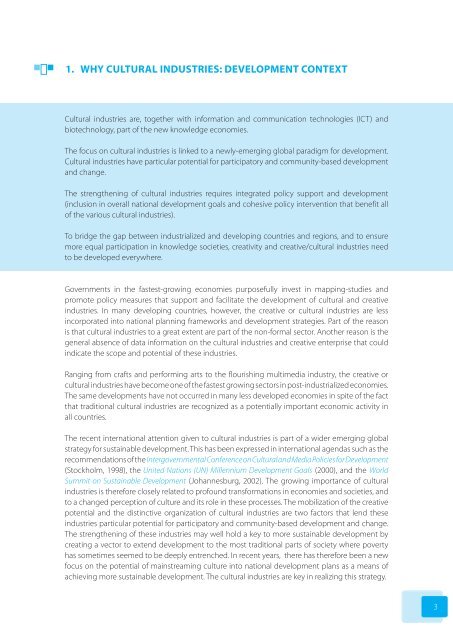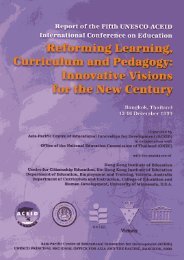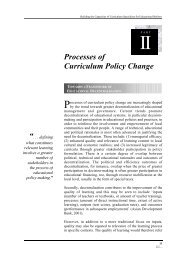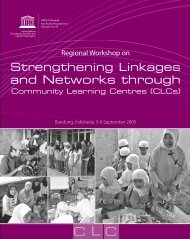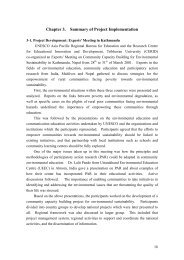Statistics on Cultural Industries - International Trade Centre
Statistics on Cultural Industries - International Trade Centre
Statistics on Cultural Industries - International Trade Centre
- No tags were found...
Create successful ePaper yourself
Turn your PDF publications into a flip-book with our unique Google optimized e-Paper software.
1. Why <strong>Cultural</strong> <strong>Industries</strong>: Development C<strong>on</strong>text<strong>Cultural</strong> industries are, together with informati<strong>on</strong> and communicati<strong>on</strong> technologies (ICT) andbiotechnology, part of the new knowledge ec<strong>on</strong>omies.The focus <strong>on</strong> cultural industries is linked to a newly-emerging global paradigm for development.<strong>Cultural</strong> industries have particular potential for participatory and community-based developmentand change.The strengthening of cultural industries requires integrated policy support and development(inclusi<strong>on</strong> in overall nati<strong>on</strong>al development goals and cohesive policy interventi<strong>on</strong> that benefit allof the various cultural industries).To bridge the gap between industrialized and developing countries and regi<strong>on</strong>s, and to ensuremore equal participati<strong>on</strong> in knowledge societies, creativity and creative/cultural industries needto be developed everywhere.Governments in the fastest-growing ec<strong>on</strong>omies purposefully invest in mapping-studies andpromote policy measures that support and facilitate the development of cultural and creativeindustries. In many developing countries, however, the creative or cultural industries are lessincorporated into nati<strong>on</strong>al planning frameworks and development strategies. Part of the reas<strong>on</strong>is that cultural industries to a great extent are part of the n<strong>on</strong>-formal sector. Another reas<strong>on</strong> is thegeneral absence of data informati<strong>on</strong> <strong>on</strong> the cultural industries and creative enterprise that couldindicate the scope and potential of these industries.Ranging from crafts and performing arts to the flourishing multimedia industry, the creative orcultural industries have become <strong>on</strong>e of the fastest growing sectors in post-industrialized ec<strong>on</strong>omies.The same developments have not occurred in many less developed ec<strong>on</strong>omies in spite of the factthat traditi<strong>on</strong>al cultural industries are recognized as a potentially important ec<strong>on</strong>omic activity inall countries.The recent internati<strong>on</strong>al attenti<strong>on</strong> given to cultural industries is part of a wider emerging globalstrategy for sustainable development. This has been expressed in internati<strong>on</strong>al agendas such as therecommendati<strong>on</strong>s of the Intergovernmental C<strong>on</strong>ference <strong>on</strong> <strong>Cultural</strong> and Media Policies for Development(Stockholm, 1998), the United Nati<strong>on</strong>s (UN) Millennium Development Goals (2000), and the WorldSummit <strong>on</strong> Sustainable Development (Johannesburg, 2002). The growing importance of culturalindustries is therefore closely related to profound transformati<strong>on</strong>s in ec<strong>on</strong>omies and societies, andto a changed percepti<strong>on</strong> of culture and its role in these processes. The mobilizati<strong>on</strong> of the creativepotential and the distinctive organizati<strong>on</strong> of cultural industries are two factors that lend theseindustries particular potential for participatory and community-based development and change.The strengthening of these industries may well hold a key to more sustainable development bycreating a vector to extend development to the most traditi<strong>on</strong>al parts of society where povertyhas sometimes seemed to be deeply entrenched. In recent years, there has therefore been a newfocus <strong>on</strong> the potential of mainstreaming culture into nati<strong>on</strong>al development plans as a means ofachieving more sustainable development. The cultural industries are key in realizing this strategy.


